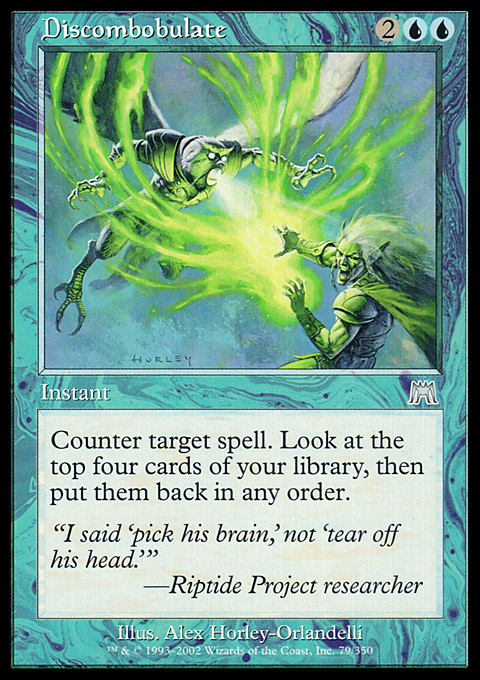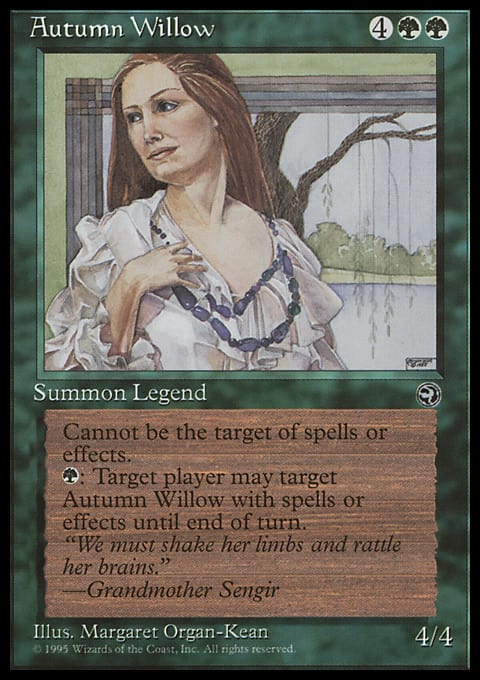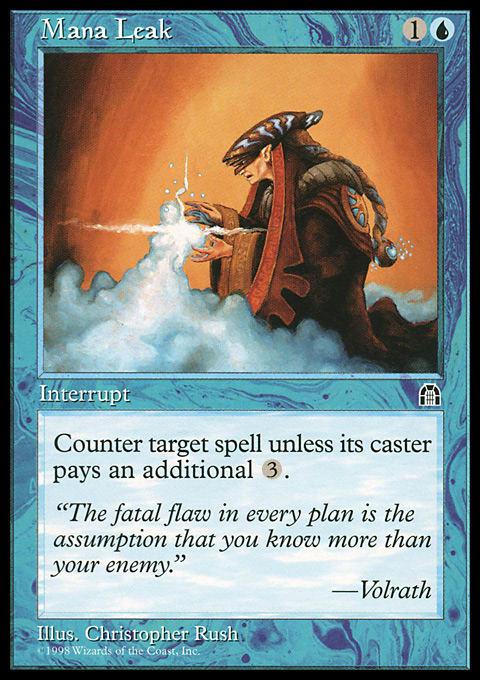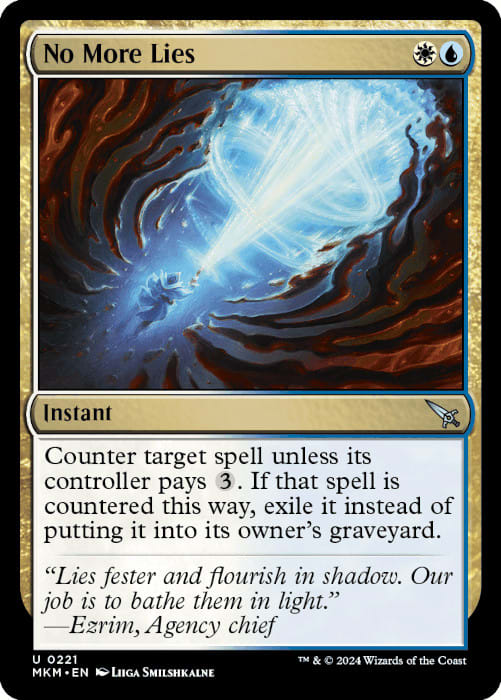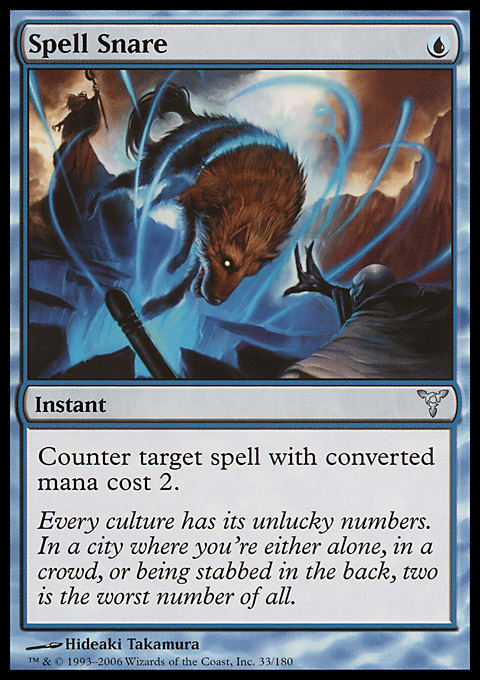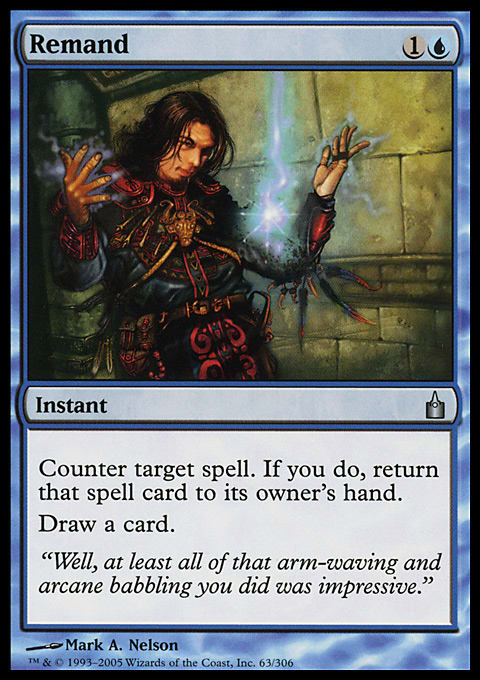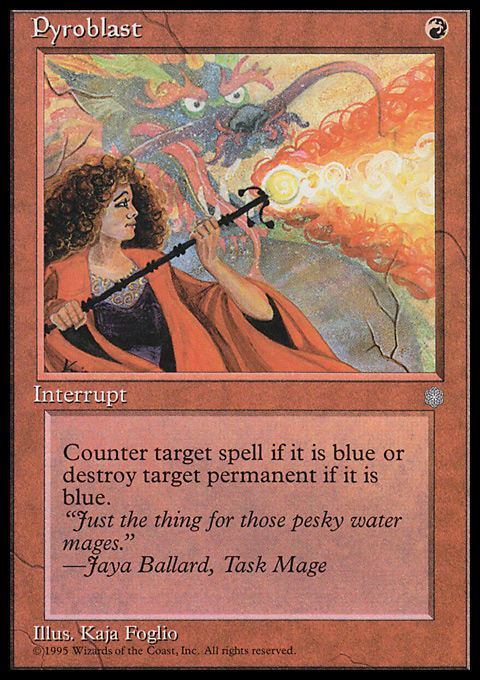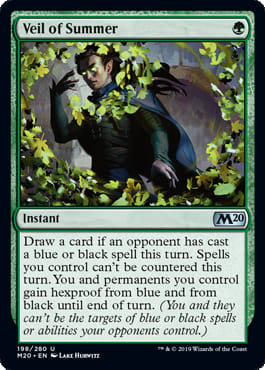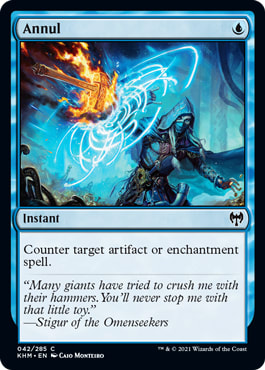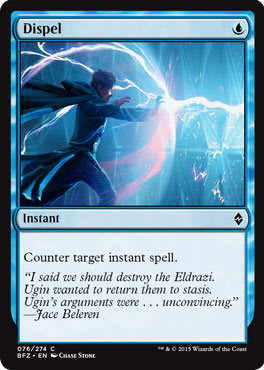The Icon, unchanged since Alpha:
Counterspell is the icon in part because it comes from a more naive time; when players thought that unconditionally answering a threat one-for-one was the be-all and end-all of Countering Target Spell. Counterspell in this era was often compared with Swords to Plowshares and Disenchant; and all three cards were often played together as four-ofs in not just Standard but even Vintage decks. Sorry, Type II and Type I. Counterspell itself was great; relatively cheap and of course flexible... The downside was that it couldn't stop things that had already happened (which is why players in olden times tended to pair Blue with White).
The card Counterspell itself has at different times been deemed too good - necessitating replacements like Cancel in Standard play - to being kind of an afterthought in reprint. Like, it's legal in Modern right now but not exactly exciting, well, anyone.
Given the unbelievable success of cards like Silumgar's Scorn in Standard not-so-far-gone... Isn't it kind of surprising that we're always kind of surprised when someone casts the original Counterspell in Modern?
Like, is it even good?
The answer is yes, obviously; but just not good at everything.
A more seasoned analysis asks us to look at Countering Target Spell through at least 3.5 lenses.
Depending on context, Counterspell is actually pretty good at all of them... But sometimes kind of unplayable at some of them.
Before we delve into the Three-and-a-Half Kinds of Counterspells, just note: Many Counterspell-variants can fit into more than one category. Dismiss is quite expensive and slow; but if you're about to win, it can Protect the Queen. By the same token, if you have a bazillion mana and the opponent is playing off the top, a Disrupting Shoal does a perfectly good vanilla One-for-One job, even if that's not its express reason to exist.
Tempo Counterspells though?
Sus.
One-for-One
"The Base Model"
In a sense, this lens is every Counterspell. I mean some of them are actually one-for-two (or even one-for-three in the case of Foil); and sure, some of them are two-for-one in the case of Exclude or Force Void... But the core is my card for your card. One-for-one. Mano a mano.
Generally you want your Counterspells to be cheaper than whatever they are countering; but that's not unique relative to disruption or removal. The truly weird thing about Counterspells through the most basic lens, I think in particular as a result of their flexibility, is that there are almost no rules other than that they can Counter Target Spell appropriately.
My friend Brian David-Marshall once looked at a PTQ-winning deck with Discombobulate...
... and declared that there was no Counterspell too expensive to win a Constructed tournament. This card is like the world's worst Dismiss right?
Also keep in mind that the best decks the winning ![]()
![]() player (who has four PT Top 8s and a Hall of Fame ring but at this point was compelled to re-qualify the hard way) had to battle though had Goblin Warchief or at least Lightning Rift, both of which slide under Discombobulate.
player (who has four PT Top 8s and a Hall of Fame ring but at this point was compelled to re-qualify the hard way) had to battle though had Goblin Warchief or at least Lightning Rift, both of which slide under Discombobulate.
It is kind of the case that if all you're trying to do is "answer stuff and keep playing", the upper cost of a Counterspell can be anything you can cast. Counterspells played this way properly belong in the "Status Quo" section, but so do many straight One-for-One Counterspells, so we're mentioning it here, first.
In 2024 the classic my-card-for-your-card-full-sentence only works if both players are just playing one card per turn. Sophisticated contemporary offenses don't even need cards like Cavern of Souls to beat this kind of Counterspell, but nor does that doesn't prevent them from showing up successfully in deck lists.
The emblematic One-for-One must Must MUST be Hammer Regnier from PT1:
U/W Control | Shawn "The Hammer" Regnier, 1996 Pro Tour New York
- Instants (20)
- 4 Counterspell
- 4 Disenchant
- 4 Power Sink
- 4 Spell Blast
- 4 Swords to Plowshares
- Sorceries (6)
- 1 Balance
- 1 Recall
- 4 Wrath of God
- Enchantments (3)
- 3 Land Tax
- Artifacts (8)
- 1 Ivory Tower
- 1 Zuran Orb
- 3 Icy Manipulator
- 3 Millstone
- Lands (23)
- 4 Island
- 6 Plains
- 1 City of Brass
- 1 Ruins of Trokair
- 3 Mishra's Factory
- 4 Adarkar Wastes
- 4 Svyelunite Temple
Hammer nearly won the first Pro Tour with Power Sink and Spell Blast in his deck! This was accomplishable only because the most dangerous threat of the era looked something like this:
Yeah.
Really.
Okay also this:
But if the opponent isn't really threatening to actually beat you until they can lace together multiple 4+ mana spells, possibly over multiple turns, then dealing with one spell per turn - no matter how expensive it is for you to do so - looks like a viable use case for a Counterspell.
Confused? Just note for a moment that all these count as One-for-One:
Spell Snare versus Azorius Signet
Mana Leak versus Primeval Titan
Pact of Negation versus Counterspell
Tempo
"Manage Time"
The best way to think about Tempo Counterspells are that they are the Counterspells that you cast before your game plan is actually going. You use them to buy the time to execute on your plan. By contrast, Protect the Queen Counterspells help you get your plan online directly; and Status Quo ones keep the game going the way you want, once it's already going your way.
It turns out I had innovated Tempo Counterspells without really understanding that I did (at least in fair decks). I didn't have language around that yet. I only understood that playing something bigger than anything in my opponent's deck would lead to winning; and that what I mostly had to do was live long enough to get there.
In the mid-aughts, the mantra was that if you could play something better than any card in the opponent's deck, then it was okay to tap out for it. This was kind of a lie because when we first started at States (Julian beat me in the 74-card mirror in the Finals that year) we did have Disrupting Shoal as a kind of Force of Will safety valve... But this statement was entirely true by PT Honolulu.
Flores Blue Control | Julian Levin, 2005 Champs New York
- Creatures (10)
- 3 Keiga, the Tide Star
- 3 Meloku the Clouded Mirror
- 4 Jushi Apprentice / Tomaya the Revealer
- Enchantments (4)
- 4 Threads of Disloyalty
- Lands (25)
- 10 Island
- 1 Mikokoro, Center of the Sea
- 1 Minamo, School at Water's Edge
- 1 Miren, the Moaning Well
- 1 Oboro, Palace in the Clouds
- 1 Shizo, Death's Storehouse
- 2 Dimir Aqueduct
- 4 Quicksand
- 4 Watery Grave
- Sideboard (15)
- 2 Dimir Aqueduct
- 4 Drift of Phantasms
- 3 Cranial Extraction
- 2 Rewind
- 4 Execute
U/R Tron | Osyp Lebedowicz, 2006 Pro Tour Honolulu
- Creatures (8)
- 4 Keiga, the Tide Star
- 4 Meloku the Clouded Mirror
- Instants (10)
- 2 Telling Time
- 4 Compulsive Research
- 4 Electrolyze
- Enchantments (2)
- 2 Confiscate
- Artifacts (4)
- 4 Izzet Signet
- Lands (23)
- 1 Minamo, School at Water's Edge
- 2 Tendo Ice Bridge
- 4 Shivan Reef
- 4 Steam Vents
- 4 Urza's Mine
- 4 Urza's Power Plant
- 4 Urza's Tower
- Sideboard (15)
- 4 Annex
- 4 Giant Solifuge
- 2 Pyroclasm
- 2 Repeal
- 1 Ryusei, the Falling Star
- 2 Smash
I was a little concerned in Honolulu that we didn't have any real way to lock down the end game. Rewind in the States deck was kind of great for that in the "One-for-One" / "Status Quo" sense... No one [except maybe Shaheen Soorani] thinks Rewind is a very good Counterspell. "But at least you know how much it costs," according to onetime Canadian National Champion Mike Donais.
It was US National Champion Eugene Harvey that pointed out we kind of didn't have to lock down the end game [with permission]. The Eugenius pointed out our game plan was just to use Counterspells to manage time. Who even cared if the opponent eventually resolved their thing? Their thing sucked! A 2/2 Knight couldn't possibly matter. We had Ryusei, the Falling Star! How many times do you need to hit with your giant Dragon if you're just going to Blaze them with Tron mana after a couple of attacks?
WotC is perfectly fine printing any number of Tempo Counterspells right now. The most popular Counterspells prior to No More Lies have all been kind of weaker Mana Leak variants with some potential upsides. Now, of course, we have a better Mana Leak, at least in the ![]()
![]() deck.
deck.
In 2024, No More Lies is the avatar Tempo Counterspell. If you've read any of my stuff here on CoolStuffInc since winning an RCQ last month, you know that I feel like the default ![]()
![]() decks can't answer anything in the late game. But No More Lies is exceptionally good at helping to keep you alive until the point that the opponent can just tap an extra three, willy-nilly, later in the game.
decks can't answer anything in the late game. But No More Lies is exceptionally good at helping to keep you alive until the point that the opponent can just tap an extra three, willy-nilly, later in the game.
The challenge when playing against Tempo Counterspells is literally to not turn them into some other kind of Counterspell. It is fine in some matchups to get "caught" by a No More Lies, especially if it lets you land something bigger on the next turn... But the last thing you want to do is turn a Tempo Counterspell into a real One-for-One when you don't have to; or worse, to let a winning player hold the line on the Status Quo with one. That's a disaster that will typically lead to game loss.
The gamble when playing Tempo Counterspells is that you really do have something bonkers to do in Stage Three. It's that spell's job to win the game. Mana Leak doesn't win the game - and can barely hold a lead - in the final turns. So your job when playing against these cards is, in part, to not give the opponent any freebies.
The best Tempo Counterspells - still played to medium popularity in Modern today - were printed during the original Ravnica Block.
Spell Snare was great because it could stop the prevalent two-mana mana acceleration cards of the era (everything from Azorius Signet to Farseek). It stopped other decks from getting off the ground, giving the Control player itself more time to get off the ground.
Remand was the best because tap-out Control decks literally didn't care what the opponent did. Whatever we did was ultimately going to be better, right? We just needed to live! Remand "stopped" (sometimes temporarily only) what the opponent did but also helped the tap-out Control player to keep drawing lands. That was part of it: We had to draw into 6+ mana to tap out for our Yosei or Keiga or whatever.
I won a ton with tap-out Control over a two year period. My last major tournament with one I finished Top 16 (still a cash finish, but disappointing). Beatdown Benny Lundquist won that one with Ninjas. In the Swiss match that cost me Top 8 I tempo-Countered whatever kind of Gnarled Mass my opponent did on turns three, four, and five; all with Mana Leaks.
I died several turns later with the same three lands in play.
"Good match," he said.
I was deflated, but shook his hand.
"We both know that if those Mana Leaks were just Remands, I was dead."
Okay. I felt better.
The reason the Ravnica Block Tempo Counterspells were so effective is because they could do a great job of masquerading as One-for-One Counterspells later in the game. If the opponent was planning on posterizing you with a $16,000 Lightning Helix... Well, Spell Snare got them even though it was turn 20 rather than turn two. Remand really, really looks like a hard counter if there is no next turn. Yeah?
I probably get too much credit for tap-out Control because guys like Patrick Chapin, Osyp Lebedowicz, and Gerry Thompson all gave it to me. All great deck-builders; all Constructed Champions. But Zvi Mowshowitz was playing literal Mahamoti Djinn into Blastoderm back in 2000.
But the original Tempo Counterspell was even earlier: Just not in fair decks.
[Kai from https://www.mtgtop8.com/event?e=9170&d=252462&f=EX]
High Tide | Kai Budde, 1st Place Gran Prix Vienna 1999
- Creatures (1)
- 1 Palinchron
- Instants (29)
- 1 Brainstorm
- 1 Mystical Tutor
- 2 Arcane Denial
- 3 Frantic Search
- 3 Stroke of Genius
- 3 Turnabout
- 4 Counterspell
- 4 Force of Will
- 4 High Tide
- 4 Impulse
- Sorceries (7)
- 3 Merchant Scroll
- 4 Time Spiral
- Lands (23)
- 16 Island
- 3 Volcanic Island
- 4 Thawing Glaciers
- Sideboard (15)
- 4 Pyroblast
- 4 Ophidian
- 2 Null Rod
- 1 Mountain
- 4 Hydroblast
High Tide at its true height in Extended was basically the perfect deck. Arguably even the perfect Control deck. It was just all card drawing and hitting land drops and building advantages... To the point that it had to win with a combo-kill because all the rest of the deck was devoted to the things Control decks historically wanted to do. Draw cards! Play lands! Counter Target Spell! Who had space for actual creatures or whatever? I mean, other than Palinchron.
Despite having Thawing Glaciers, High Tide was notoriously difficult to disrupt with Wasteland. One strategy was to side out Thawing Glaciers in fast matchups, just so none of your lands entered the battlefield tapped. Kai, here, has a Mountain in his sideboard, but Mono-Blue folks like YT at the time might have two Islands in the sideboard to buoy land count in post-Thaw sideboard games.
Beating High Tide with Control decks that didn't have Wasteland was an uphill battle. Because they had Thawing Glaciers, they would never miss a land drop. And, of course, they had so many Counterspells themselves!
The default game plan for High Tide was to think about its Counterspells in the "Protect the Queen" mode. For instance, jamming a third-turn High Tide-into Time Spiral with Force of Will backup.
But one strategy I learned from Adrian Sullivan - no doubt used by masters like Federico Dato, Jon Finkel, or Grand Prix Champ Kai Budde here - was to "deny the clock". You could Arcane Denial, Counterspell, or even Force of Will the opposing 2-drop... And they just wouldn't have a creature in play to pressure you.
Without a clock on the other side of the table, you would just have all the time in the world to Thaw THAW THAW until you had so many resources you could just jam through your combo without fear.
The key differentiation here is that our Counterspells are often reasonable on mana (one or 2 mana) but have something woefully wrong with them. Either our opponents draw extra cards (Arcane Denial), they only contain certain things (Spell Snare), or they stop working altogether later in the game (Mana Leak... Sometimes Memory Lapse or Remand). Our job when playing Tempo Counterspells is to get value with them, buy time, and do our awesome thing that makes their strategy irrelevant by comparison.
Protect the Queen
"Proactive Permission"
Force of Will is the emblematic Protect the Queen Counterspell because it is so often cast when you are tapped out. You might be tapped out for a Crystalline Sliver. You might be tapped out for a Time Spiral. You might be tapped out for another Counterspell, desperately trying to stop an opposing Force of Will.
Counterspells are potentially the most flexible answer cards in Magic; so a Force of Will, by extension, will sometimes force the lead as we're discussing here; but might other times just stop a threat, if at cost... This might even happen in the same deck, like when we looked at Kai's combo deck a moment ago.
The same Counterspells look different in different decks, so sometimes it is hard to say which role one is playing... Especially when it's Force of Will. The easiest way to think about it is that Tempo and Status Quo Counterspells are both by nature trying to prevent the opponent from executing, while a Protect the Queen Counterspell, whether in a fair or an unfair deck, helps you to execute your proactive game plan.
Consider this deck by PT Champ Farid Meraghni:
Blue Skies | Faird Meraghni, 2001 French Nationals
- Creatures (12)
- 4 Drake Hatchling
- 4 Rishadan Airship
- 4 Troublesome Spirit
- Instants (19)
- 1 Misdirection
- 2 Daze
- 2 Rushing River
- 2 Thwart
- 4 Foil
- 4 Gush
- 4 Opt
- Sorceries (7)
- 3 Wash Out
- 4 Sleight of Hand
- Artifacts (4)
- 4 Chimeric Idol
- Lands (18)
- 18 Island
- Sideboard (15)
- 1 Teferi's Response
- 3 Ribbon Snake
- 3 Withdraw
- 4 Rising Waters
- 2 Misdirection
- 1 Thwart
- 1 Wash Out
If you were wondering if a Blue deck could beat you with Counterspells despite constantly being tapped out... The answer was surprisingly yes. BDM's ceiling comment might have been even wider than just mana cost. To the point that any number of land drops - one, two, three - or any number of cards (well, up to three) might be worth it - not to stop the other player - but to keep your own plan on the rails.
The bet was that your Chimeric Idol - a plodding Gnarled Mass if ever there was one - and Troublesome Spirit (go ahead and read that one) had to be good enough to beat hasty Blastoderm and Saproling Burst and out-last the constant card advantage of a Rebel chain at the extremes of the metagame.
That's a tough bet... Especially if you're always tapped out.
The free Counterspells in this deck mingled elements of Tempo, Status Quo, and of course Protect the Queen (the Queen in this case probably being a 3/1 flyer). They aren't directly "Tempo" because it's not your time to build advantages you're managing... It's the opponent's time still playing. Sometimes they're Status Quo... But the Status Quo involves you attacking for six or nine for just one more turn.
These kinds of Counterspells can be very costly to play. Daze is counterintuitive for every traditional Blue mage ever. Thwart is three times as counterintuitive. If you didn't like the card economy on Force of Will... Have you seen Foil? A four-of in Farid's deck!
Despite being painfully "fair" in game plan, the utilization of permission here is remarkably similar to how combo decks use their interaction. If you're trying to answer a threat... You're probably going to wince at their Iron Price. The original Counterspell itself was legal and Farid literally didn't play it; Withdraw was the better ![]()
![]() instant! You used permission here to make sure you could cram your game plan down the opponent's throat. For like just a few turns... Because you were giving up lots of economy! Smells deceptively like a Control deck, acts like a beatdown deck, but really cousins to a combo deck, at least in the Blue instants department.
instant! You used permission here to make sure you could cram your game plan down the opponent's throat. For like just a few turns... Because you were giving up lots of economy! Smells deceptively like a Control deck, acts like a beatdown deck, but really cousins to a combo deck, at least in the Blue instants department.
Again, if you didn't have Chimeric Idol or Troublesome Spirit and you really, really wanted to spend four mana to counter your opponent's threat like some kind of Discombobulate gamer? Thwart and Foil were there for you... But those cards were really included in the deck list for their ACCs.
[McCord from https://www.mtgtop8.com/event?e=9228&d=252936&f=EX]
Full-On Trix | Scott McCord, 2nd Place Grand Prix Philadelphia 2000
- Instants (19)
- 1 Contagion
- 1 Hoodwink
- 2 Brainstorm
- 3 Vampiric Tutor
- 4 Dark Ritual
- 4 Demonic Consultation
- 4 Force of Will
- Enchantments (8)
- 4 Illusions of Grandeur
- 4 Necropotence
- Artifacts (4)
- 4 Mana Vault
- Lands (21)
- 3 Island
- 6 Swamp
- 4 Gemstone Mine
- 4 Underground River
- 4 Underground Sea
- Sideboard (15)
- 2 Unmask
- 4 Phyrexian Negator
- 3 Hydroblast
- 3 Annul
- 2 Contagion
- 1 Hoodwink
Trix was the best deck of its era, the true Enigma, and the best deck until Sadin's Flash-Hullk nearly a decade later.
What differentiated Trix from almost any deck, with the possible exception of High Tide, was that it played literally all the best cards available and broke them harder than every other deck. This deck basically used Vampiric Tutor and Demonic Consultation to assemble Dark Ritual and Necropotence; and once you had Necropotence, you were just going to get the opponent dead.
Beatdown decks had a hard time beating you because you gained 20 life in the middle of the combo.
Control decks had a hard time beating you because you only played one Counterspell... But it was Force of Will. So, you could literally Unmask the opponent to open, Ritual + Necropotence, and still have Force of Will backup on the first turn. Now you were in "draw seven" mode and good luck to an opponent who couldn't pressure your life total.
Force of Will here could slow down a threat if you wanted to take a few turns setting up your artifact mana or something. It was probably pretty cute in the Troublesome Spirit vein when you switched into first-turn Ritual + Negator. But this deck - this utilization of Force of Will - was the literal reason that Brian Kibler invented the strategic concept of using permission to force through your plan, rather than trying to stop someone else's.
People were doing it already, clearly; but the Dragonmaster gave us words.
As we've said there is quite a bit of blending between roles, especially when we think about Force of Will specifically.
[deck from https://www.mtgtop8.com/event?e=49647&d=566373&f=LE]
Canadian Druid | Legacy | Julian Jakobovits, 1st Place Eternal Weekend Europe 2023
- Creatures (11)
- 3 Murktide Regent
- 4 Delver of Secrets
- 4 Dragon's Rage Channeler
- Instants (18)
- 1 Stern Dismissal
- 1 Unholy Heat
- 4 Brainstorm
- 4 Daze
- 4 Force of Will
- 4 Lightning Bolt
- Artifacts (4)
- 4 Mishra's Bauble
- Lands (21)
- 1 Island
- 1 Tropical Island
- 2 Flooded Strand
- 2 Misty Rainforest
- 2 Polluted Delta
- 2 Scalding Tarn
- 4 Volcanic Island
- 4 Wasteland
- 3 Questing Druid
- Sideboard (15)
- 1 Surgical Extraction
- 3 Pyroblast
- 2 Meltdown
- 1 Grafdigger's Cage
- 3 Force of Negation
- 2 Counterbalance
- 2 Blood Moon
- 1 Unholy Heat
Legacy Delver decks are the best example of decks that start with Force of Will, but side it out in most matchups. Costly Counterspells that Force you to pick up lands or discard potentially multiple cards are liabilities against other decks that build material advantages. They are often the most useful main deck for combo decks - who themselves use Force of Will proactively - but tend to be quite bad against opponents with a bunch of two-for-ones.
The key differentiation here is that our Counterspells tend to be unconditional... But hyper costly in terms of getting them cast. Think Pact of Negation in an Amulet Titan deck, or the prohibitive ACCs of Thwart or Foil. The payoff is that games tend to be over soon after we cast them, so the bill kind of never comes due.
Status Quo
"Hold a Lead" or "It's Anyone's Game"
If someone just says "Counterspell" to me, this implementation of the One-for-One is usually where my mind defaults. Open field, you're doing your thing. I'm doing my thing. I ignore a lot of what you're doing because my thing is better. Every so often that isn't true and I have to Counter Target Spell.
When Hammer Regnier was Spell Blasting Erhnam Djinn it was because if he could keep the game going the way it was going... He was probably going to win.
Mono-Blue Control | Randy Buehler, Worlds 1999
- Creatures (3)
- 3 Masticore
- Instants (21)
- 1 Miscalculation
- 4 Counterspell
- 4 Dismiss
- 4 Forbid
- 4 Mana Leak
- 4 Whispers of the Muse
- Sorceries (4)
- 4 Treachery
- Artifacts (4)
- 4 Powder Keg
- Lands (28)
- 16 Island
- 4 Faerie Conclave
- 4 Stalking Stones
- 4 Wasteland
- Sideboard (15)
- 1 Masticore
- 4 Annul
- 1 Capsize
- 3 Chill
- 3 Legacy's Allure
- 2 Maze of Shadows
- 1 Stroke of Genius
Dismiss in Randy's World's deck is the absolute apex of the Status Quo Counterspell. Randy is just there minding his own business, hitting his land drops with his 28 land deck. Someday when he has enough lands (or maybe after he's Capsize-locked you) he'll attack you with one of them. Ten times.
But in the meantime he's just hitting land drops and maybe buying back Whispers of the Muse.
The early game is Mana Leak and (lol) Miscalculation. He can catch up with Powder Keg and Treachery to get to the point where he's just leisurely playing a land every turn.
But every so often?
He has to Counter Target Spell. Dismiss is the card that keeps him rich enough to do it again and again and again until you've been poked for 3 seven times by a Stalking Stones he activated rather than going to hand size with another buyback.
WotC has printed a number of lead-holding Counterspells in recent years; all of them are mostly worse than Dismiss (good old Discombobulate is a good example); but some of them are at least cheaper.
Five-Color Dragons | Michael Flores, 1st Place Pro Tour Qualifier 2015
- Creatures (10)
- 2 Icefall Regent
- 1 Dragonlord Atarka
- 1 Dragonlord Silumgar
- 3 Dragonlord Dromoka
- 3 Dragonlord Ojutai
- Planeswalkers (1)
- 1 Ugin, the Spirit Dragon
- Instants (18)
- 1 Disdainful Stroke
- 1 Dragonlord's Prerogative
- 1 Voyage's End
- 2 Anticipate
- 2 Nullify
- 3 Dig Through Time
- 4 Dissolve
- 4 Silumgar's Scorn
- Enchantments (2)
- 2 Encase in Ice
- Artifacts (2)
- 2 Perilous Vault
Silumgar's Scorn was my actual Counterspell-Counterspell here; but my lead-keeper was Dissolve at three mana. Didn't quite draw a card to keep my lead... But looking at the top one wasn't too bad.
Sinister Sabotage being even better.
Again, we're playing One-for-One here... But we just want to keep the game going the way it's going. Sometimes the outcome is uncertain and Scry, Surveil, or drawing a card leans it our way. Sometimes we have an iron wall of permission that is going to keep a slight lead indefinite.
The key differentiation here is that our Counterspells might be be more expensive on mana but have an upside that helps us to keep casting them in future turns.
Oddballs, Curiosities, and Dare I Say? Exceptions!
When are Counterspells good?
It might be better to think about when Counterspells are bad. I watched a pretty instructive video recently where my podcast partner Lanny Huang sided out actual Counterspell against an Elves opponent with Survival of the Fittest.
Isn't Counterspell a good - or at least decent - answer to Survival of the Fittest mana-wise? What happened to the Discombobulate rule?
The Elves deck could just get going too quickly. It wins with redundancy on Llanowar Elves. Or it can play multiple "must-counter" cards in a single turn, logjamming a conditional two-mana answer.
Conditional?
Isn't Counterspell-Counterspell the least conditional?
Well, what about the condition that the threat hasn't resolved yet?
Even Jon Finkel lost a Masters match twenty-four years ago not to card advantage - Jon had his opponent under the Ophidian + Forbid "lock" - but mana... The opponent could just cast multiple threats per turn.
In Lanny's case, he got to swap out Counterspell for Engineered Plague. In a sense he was willfully falling behind, but could catch back up with a two-for-one (minimum). If a deck can't pivot this way after sideboarding... That might inform why Counterspell isn't more popular in Modern.
We think of permission spells - or I have written this article, rather - as mostly Blue instants that mostly cost about two mana. That isn't everything, of course. Like...
This card is all things to all people in all roles; provided your opponent is Mono-Blue. It is literally an A+ tempo card, the classic for forcing through your strategy through opposing permission, and plays every role - from Swords to Plowshares to Disenchant in addition to being Counterspell - in the late game, and quite well.
But in true "Counterspell" fashion, Pyroblast can sometimes fail you when an opposing threat has already successfully resolved. There are lots of Premodern Red mages whose Pyroblasts got caught by a Daze baffled at how they might overcome a resolved Phyrexian Dreadnought.
Some Counterspells are just really, really, good. This one is kinda sorta a conditional Dismiss; but for only one mana. But it isn't everything. Even assuming you're playing a format where Veil of Summer isn't somehow banned, it can't, for instance, stop most permanent threats One-for-One. So as great as it is, this card has many of the limitations of a Tempo Counterspell, even though when it is doing what it does well, it can keep doing so even on the last turn of the game. Protects the Queen like few others, obviously.
These cards are the Counterspell analogues to Shatter or Terror. They're all hyper-specific, so you can't think about them in any way but surgically.
An Envelop does what it does at all stages of the game (and for a miniscule cost). But it doesn't do anything else. Thus, it lacks the flexibility, complex decisions, or understanding of roles that was largely discussed in the first three-and-a-half sections of this article.
Basically treat your Essence Scatter as a Murder for less mana, but with the unfortunate tax of actually having to leave that mana open. Cast your Disdainful Stroke when you have the opportunity (unless your opponent walks into a No More Lies that is about to lose text). That card is a classic One-for-One answer; and will rarely play Tempo for you; though can occasionally Protect the Queen from sweepers, especially when those sweepers cost five or 6 mana, as they do in contemporary Standard.
LOVE
MIKE















